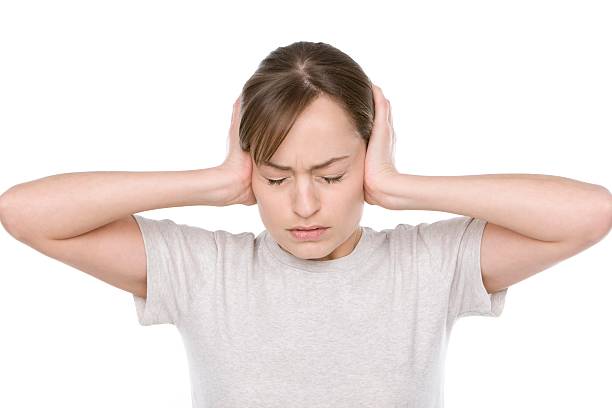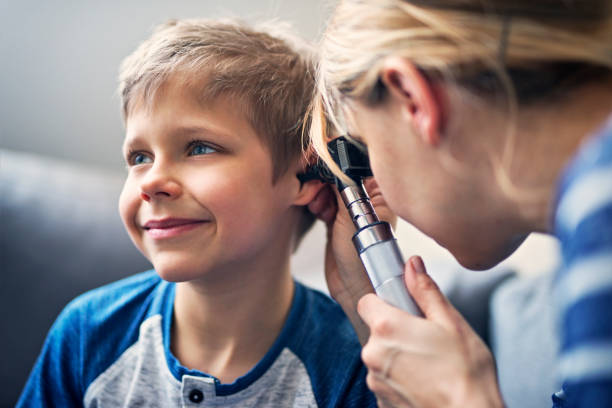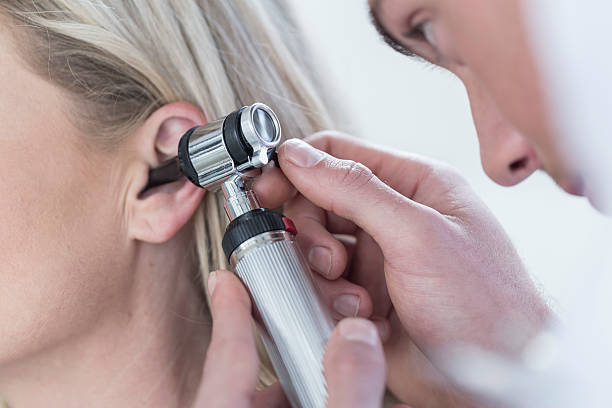The ability to play sounds well and usually shows us exactly where we are in the world. It also helps us navigate within it. Hearing is one of the 5 basic senses that make us who we are. Most people believe that sound and hearing are the most important human senses.
They also bring us joy. Thanks to what we listen to, we enjoy good music and understand what’s happening in the news, movies, and series. Do you like to lie on a lush meadow in the mountains and listen to the murmur of a nearby stream? And enjoy the sound of the waves on the beach? All this happens thanks to good hearing.
That is why we must do everything we can to prevent early hearing loss. It can happen at any time – in childhood or adulthood. The phenomenon is often temporary – like after a flu or a cold. In other cases, this is due to a lack of attention and care.
What are the different degrees of hearing loss? Could it be related to excessive listening to high-decibel music? When to wear a hearing aid? What causes tinnitus? How do I maintain my ability to hear and perceive sounds? Is it related to stress? What about blood pressure? Are There Any Side Effects of Hearing Restoration Drops?
The natural ways to maintain good hearing are endless. The market also offers countless natural alternatives to restore hearing.
Below we will learn the 5 natural ways to get a good hearing!
Seeing and hearing – the most important human senses!

Hearing refers to our ability to perceive sounds and noises of different types, strengths, and frequencies. We use it to listen to music, talk to others, and assess the social situations we find ourselves in. Humans have a relatively narrow hearing range compared to other animal species. This important sense is easily susceptible to various types of stress and impact. We were born with it, but we have to take care every day that good hearing is our faithful companion. The official website of the Centers for Disease Prevention and Control in the United States advises us to pay special attention to noise stress in the work environment.
To ensure good hearing, we must understand it!
- First, you must learn to distinguish between hearing as action and hearing as sense. Listening is something you do consciously when trying to interpret or understand a sound you hear. As well as the distinction between individual sound waves. The inability to hear (correctly perceive) the world around us often leads to depression and feelings of isolation.
- Second, hearing is the ability to perceive sound by detecting vibrations coming from the ear. To understand how you hear and how premature hearing loss occurs, you need to understand the mechanisms of the ear. Without each of these components, you cannot hear effectively. The human ear can be divided into 3 main parts: outer, middle, and inner ear. And the center of hearing is in the brain.
How do I get early hearing loss?

There are different types of hearing loss. It can be conductive, sensorineural, and mixed. The reduced ability to hear sounds is also broken down into separate categories that describe the severity of the case.
They are the following:
- Mild hearing loss: With this, a person has difficulty holding conversations, especially in noisy environments, but does not require a hearing aid.
- Moderate: People with moderate hearing loss have difficulty following conversations without a hearing aid.
- Difficult: This is where people often rely on lip reading, even when using hearing aids. If you have severe hearing loss, it might be worth exploring whether other options like a cochlear implant or middle ear implants are a good option for you.
- Low: Hearing is extremely impaired and communication is primarily through sign language.
What are the main signs of hearing loss?
Most people can understand that hearing is important, but have difficulty articulating exactly why. The sounds you hear every day are designed to enrich your life. The chirping of the birds, the laughing child, or your favorite song has an intangible value. However, it shapes everyday life in a way that we often take for granted.
To counteract early hearing loss and diseases such as tinnitus, you must recognize the signs. Here are the main symptoms of hearing loss:
- Increasing difficulty understanding speech in a noisy background, e.g. B. in a bar or a restaurant.
- Conversation requires more focus (and possibly lip reading), especially when multiple people are speaking.
- Although you need a higher volume on the TV, this does not always make the speech on the screen clearer.
- When shopping, you don’t always understand the seller.
- It is difficult to hear others clearly when driving or using public transport
- People who know you well notice that your hearing has deteriorated.
Below we’ve outlined the 5 natural ways to get a good hearing!
5 easy steps to protect good hearing

Most people in the world are free to use their 5 basic senses. These are hearing, smelling, seeing, tasting, and touching. Of course, some people suffer from congenital or acquired chronic diseases and conditions that impair their ability to function normally. This could be the partial loss of the ability to perceive and reproduce sound in one of the ears—or farsightedness, astigmatism, and myopia as visual disorders. Any constant obstruction to our senses diminishes the quality of life we lead. And we feel less fulfilled.
According to the WHO (World Health Organization), 1 in 5 or 5.5% of all adults suffer from some form of hearing loss. Of these, more than 1 billion people are between the ages of 18 and 35. This translates into $980 million in annual healthcare costs.
Unfortunately, we very seldom ask ourselves if everything is okay with our hearing. Only in the case of hearing loss or tinnitus (tinnitus) do we decide to visit an ear, nose, and throat specialist. And that makes preventive measures ineffective.
What can I do to keep my hearing good? How to properly prevent deafness? Do I need to regularly clean my earwax with a solution? Do I have to be careful what decibels I expose myself to?
Below we have selected 5 easy steps to get a good hearing that anyone can follow!
- In a noisy environment, use earplugs and other decibel regulators! Most of these products are made of foam or rubber and penetrate the ear canal well. They can reduce noise by 15 to 30 decibels. They reduce the noise level at all
- frequencies evenly. Useful for people who play music or work in construction.
Listen to radio, television, and music at lower levels. You can significantly reduce the volume of the devices around you. This helps protect the health of your hearing. - Limit smoking and alcohol consumption. It may sound strange that both of these malicious habits interfere with your ability to reproduce and perceive sound normally. But this is a scientific fact! Studies clearly show that cigarette smoke, whether passive or active, is harmful to hearing. The same goes for using hard alcohol, which can create a toxic environment in the ear.
Exercise regularly and reduce stress. Regular exercise strengthens - blood circulation and ensures proper blood supply to the ears. Mental tension and stress stop the blood flow. Live more calmly and exercise regularly to avoid hearing loss or loss.
- Eat more foods rich in vitamins and minerals! Did you know that some vitamins, such as B12, are important for good hearing? The same applies to minerals such as potassium and magnesium. Iron deficiency anemia has also been shown to be associated with a decreased ability to reproduce sound.
#1. Clean Ear Mud Regularly!
Also known by the medical term cerumen, earwax is a natural defense mechanism. It protects the inside of the ear from foreign particles, bacteria, and infections. It is secreted by special glands in your outer ear and varies in color and texture.
Although a small amount of earwax is beneficial, accumulation of excess earwax can lead to mild hearing loss and discomfort. If you suspect you have a blockage, see your ear, nose, and throat doctor. Never try to remove it yourself. You run the risk of pushing it into your ear and damaging the delicate lining of the ear canal or eardrum.

#2. Emphasize vitamins and minerals!
Several vitamins and minerals have been linked to improving ear and hearing function. Among them, folic acid ranks first. It promotes proper blood circulation in the ears and energy production in the cells. Magnesium is also important. It supports healthy nerve function in the hearing system and prevents damage to the inner lining of the arteries.
Zinc protects the hair cells in the ears, which are responsible for emitting vibrations that send electrical signals to the brain. It also supports the body’s immune system by counteracting ear infections. B vitamins offer many potential hearing-preserving benefits, including regulating fluid levels and optimizing oxygen consumption.
#3. Cut down on cigarettes!
Studies show that smoking increases the risk of early hearing loss by 2 times. Hearing and hearing are severely affected by the effects of nicotine and carbon monoxide. Smoking also irritates the lining of the middle ear and disrupts the normal functioning of the Eustachian tube. Nicotine has been shown to cause tinnitus (tinnitus). Some experts think it can interfere with neurotransmitters that carry messages from the auditory nerve to the brain.
#4. Do regular ear exercises!

The ears identify, but it is the brain that interprets them. Exercises that strengthen your brain’s listening skills can help you become a better listener. A kind of ear gymnastics can be carried out very easily. Take a walk in the woods, on the beach, or in a similar environment with some artificial noise. Focus on your surroundings and record everything you hear, from birdsong to gusts of wind. Repeat this exercise for several days in a row to adjust more easily to the surrounding noise.
You can try something else. Have a friend read from a book or magazine on an unfamiliar topic. After each sentence, try to repeat exactly what he said. When you’ve managed to repeat the phrases verbatim, repeat the exercise with the TV on or in a noisy restaurant. Of course, you don’t have to worry about hearing exercises.
#5. Meditate regularly and intensely!
More and more people are turning to meditation to improve hearing health. This is because relaxation and deep breathing increase blood flow to the brain. This can help you better tune into sounds that generally escape your attention. Although it’s more of a mental exercise than physical activity, meditation can be useful for those who want to hear more clearly. Howthis, you can always count on Hear Complex organic caps if you do not have enough time for thisules.
The sound of life brings joy and peace!

Every child and every adult enjoys the singing of the birds early in the morning. The same applies to conversations that are held in loud and cheerful company. To be able to enjoy them, you must do everything you can to keep your hearing good. Don’t let anything take it away



